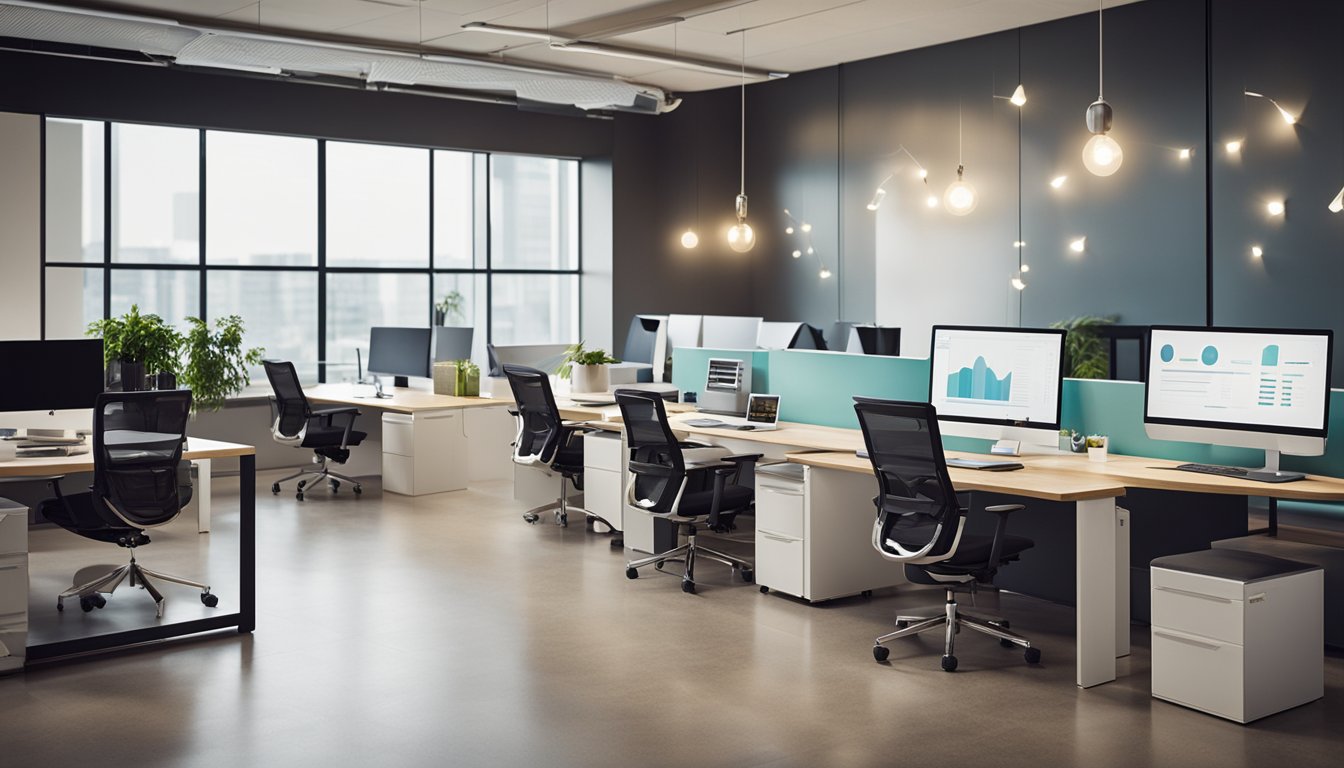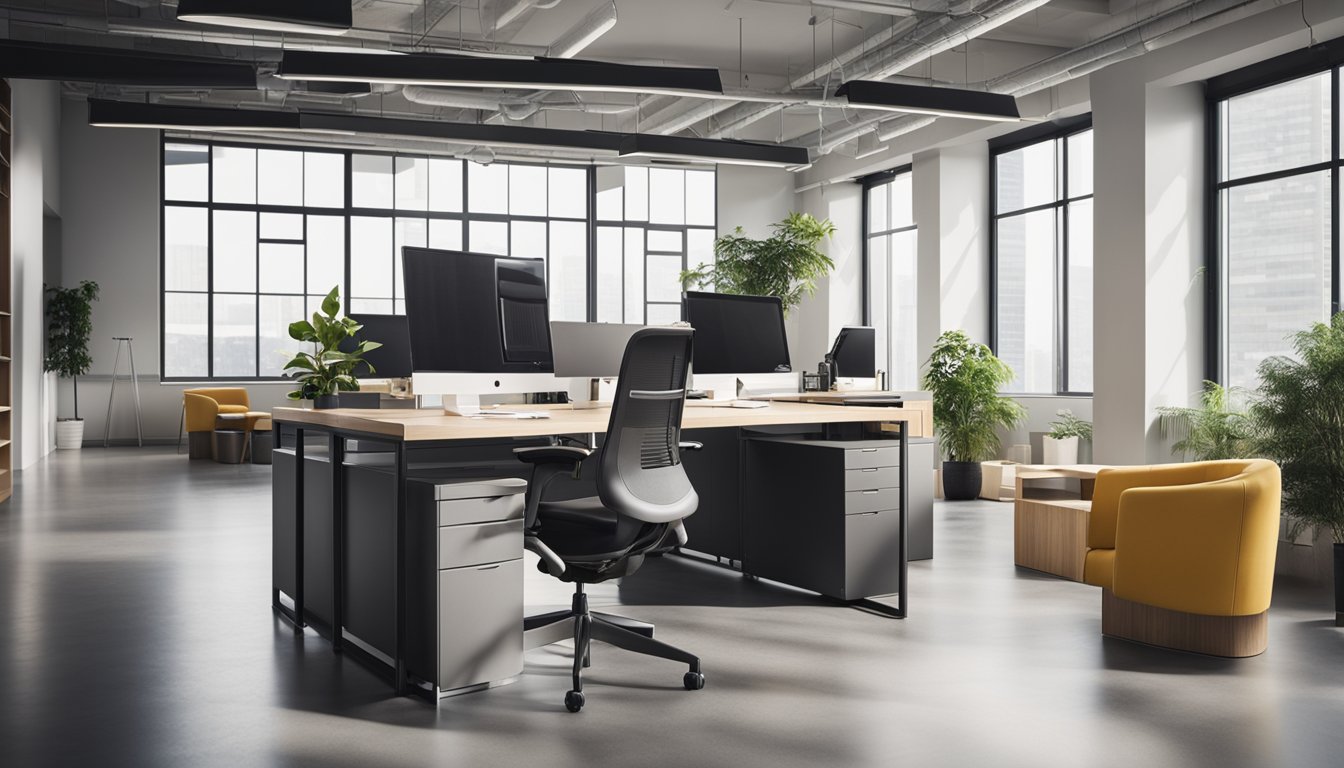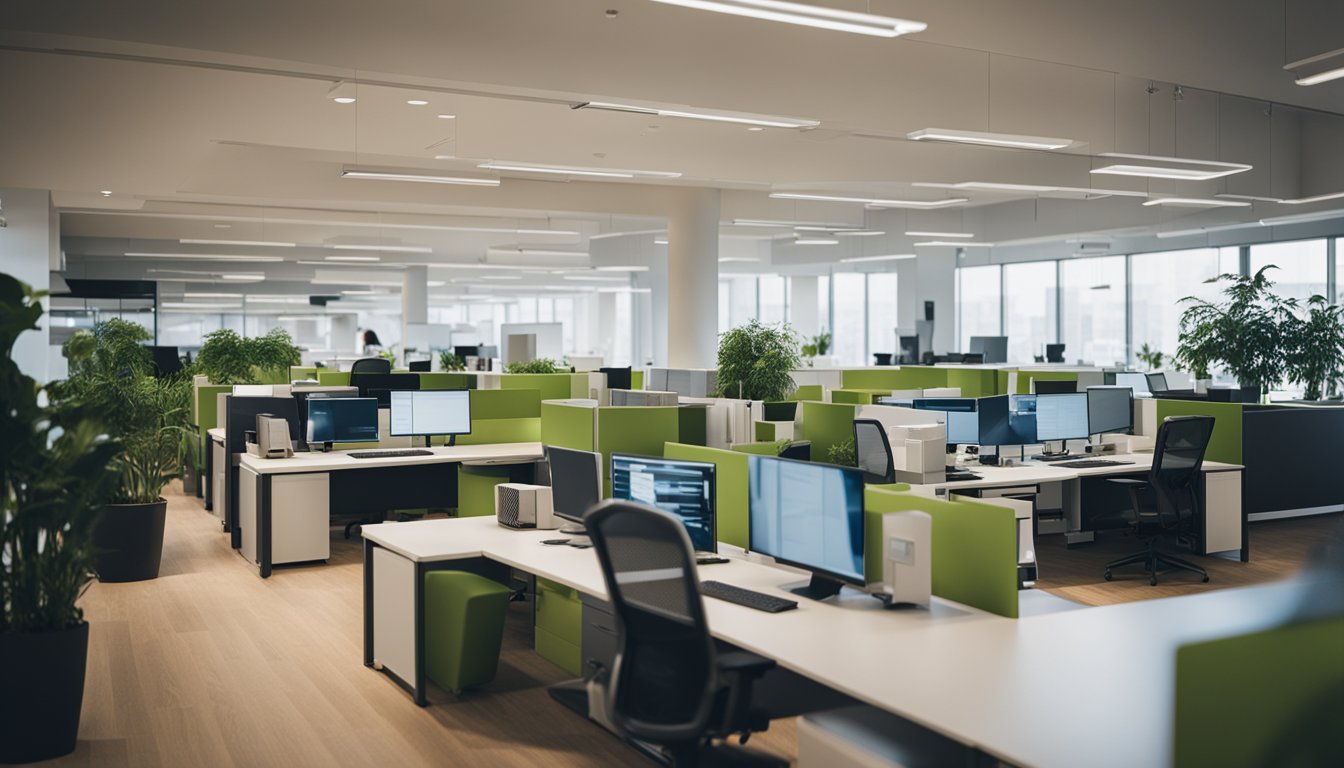Late updated: 13 Dec 2024 12:12
Written by: Amber Collins
Choosing Sustainable Office Furniture for UK Businesses: A Guide to Eco-Friendly Selections
In today's business landscape, sustainability is more than a buzzword; it's a powerful driver for change. UK businesses are increasingly recognising the importance of sustainable practices in all aspects of operations, including the choice of office furniture. Choosing sustainable office furniture is a pivotal step for businesses aiming to enhance their environmental responsibility while potentially reducing costs. This conscious decision can significantly impact your company's carbon footprint and contribute to broader eco-friendly goals.

Sustainable office furniture often incorporates renewable, recycled, or biodegradable materials, promoting a healthier workspace and aligning with the UK's net-zero carbon emissions targets. Selecting such furniture not only supports environmental conservation but also reflects a commitment to corporate social responsibility. By integrating sustainability into our office design, we can foster a greener future and inspire others in our industry.
Furthermore, opting for eco-friendly office solutions can enhance the wellbeing of employees through improved indoor air quality and ergonomics, ultimately leading to increased productivity. As we explore this topic, we will delve into practical considerations, benefits, and solutions that sustainable office furniture offers to UK businesses.
Key Takeaways
- Sustainable furniture reduces carbon footprint.
- Eco-friendly choices improve employee wellness.
- Practical benefits align with corporate goals.
Understanding Sustainable Furniture
In our exploration of sustainable office furniture, we consider vital aspects: sustainable practices, materials reducing environmental harm, and key certifications. These elements are crucial in crafting eco-friendly office solutions.
Defining Sustainability in Office Furnishings
Sustainability in office furnishings involves creating products with minimal environmental impact. Durability and longevity are at the forefront, ensuring furniture pieces last longer, reducing the need for replacement. Sustainable practices often include the use of eco-friendly materials, such as recycled content, recycled plastics, and reclaimed wood. Emphasis is placed on reducing the carbon footprint from production to disposal. Our commitment to sustainability is evident in our careful selection of materials and processes that preserve the environment.
Materials and Environmental Impact
The choice of materials is critical in reducing the environmental impact of office furniture. Using materials like FSC-certified wood, bamboo, and non-toxic substances helps lessen adverse ecological effects. Recycled materials are especially beneficial, as they reduce waste and the demand for raw resources. These materials decrease harmful emissions associated with traditional manufacturing. The production methods aim to conserve energy and minimise carbon emissions, reinforcing our mission towards a greener future.
Certifications and Standards
Certifications validate the sustainability of office furniture, guiding us in making informed choices. Notable certifications include the Forest Stewardship Council (FSC), ensuring responsible wood sourcing, and GREENGUARD, which verifies low emissions of volatile organic compounds. Cradle to Cradle certification focuses on sustainable product life cycles. These standards provide assurance that our furniture meets stringent environmental criteria. Through these certifications, we ensure that our offerings contribute positively to a sustainable office environment.
Practical Considerations and Benefits

Choosing sustainable office furniture requires thought about durability, adaptability, and the workspace environment. By focusing on these aspects, we can enhance employee wellbeing, achieve financial savings, and contribute positively to the environment.
Investing in Durable and Adaptable Furniture
Durability in furniture often hinges on materials such as recycled metals and reclaimed wood. These not only last longer but also reduce our carbon footprint. Modular furniture offers adaptability, enabling us to reconfigure spaces without the need for new pieces, thus promoting a circular economy. We also consider adjustable desks and ergonomic chairs for their long-term use and adaptability to individual needs. This approach not only supports our commitment to sustainability but also minimizes waste accumulation by extending the life of existing furniture pieces.
Enhancing Employee Wellbeing and Productivity
Employee wellbeing significantly improves when we choose furniture that focuses on ergonomic design. Ergonomic chairs and desks can prevent common workplace injuries, enhancing overall employee comfort and satisfaction. Biophilic design elements, such as incorporating nature into indoor spaces, improve indoor air quality and reduce VOCs. This can decrease headaches and fatigue, thereby boosting productivity. By prioritising these designs, we ensure a healthier workplace, reflecting our commitment to ethical practices and sustainability goals.
Financial and Intangible Benefits
Investing in eco-friendly office furniture can lead to cost savings long-term. By opting for durable and refurbished furniture, we reduce replacement costs and landfill waste. This is not just about financials; there's a brand image boost as well. A commitment to corporate social responsibility and a sustainable workspace appeal to eco-conscious clients and partners. Our dedication manifests in reduced environmental impact, aligning us with net-zero ambitions and enhancing our reputation. The emphasis on ethical practices also fosters a positive workplace culture, resonating with both current and future employees.
Frequently Asked Questions

When selecting sustainable office furniture, several crucial considerations arise. These include evaluating the materials' environmental impact, understanding available certifications, and ensuring end-of-life recyclability of the products. Additionally, choosing locally-sourced options can reduce carbon emissions significantly.
What factors should be considered when assessing the sustainability of office furniture?
We must evaluate the lifecycle of the furniture, from production to disposal. Consider the use of eco-friendly materials, energy consumption during manufacturing, and the furniture’s durability. Recyclability and the possibility for repair also enhance sustainability.
How does the selection of materials impact the environmental footprint of office furniture?
Materials like bamboo or recycled metal can significantly reduce the carbon footprint compared to traditional options. Additionally, opting for low-VOC finishes helps maintain better indoor air quality, minimizing harmful emissions.
What certifications indicate that office furniture meets high environmental standards?
Certifications such as FSC (Forest Stewardship Council) and Cradle to Cradle are strong indicators of environmental commitment. These certifications ensure the materials and manufacturing processes align with sustainable practices.
In what ways can businesses ensure the end-of-life recyclability of their office furniture?
Businesses should choose modular designs that allow for easy disassembly and material separation. Partnering with recycling programs or companies that specialise in furniture recycling ensures the components are effectively processed.
What are the benefits of choosing locally-sourced office furniture for reducing carbon emissions?
Locally-sourced furniture reduces transportation-related emissions significantly. This choice also supports the local economy and can provide quicker delivery times, enhancing operational efficiency.
How can businesses effectively incorporate upcycled or refurbished furniture into their offices?
Incorporating upcycled furniture can be cost-effective and environmentally friendly. We can achieve this by working with vendors who specialise in refurbished goods and maintaining a focus on quality and aesthetics to ensure a seamless integration into our office space.
